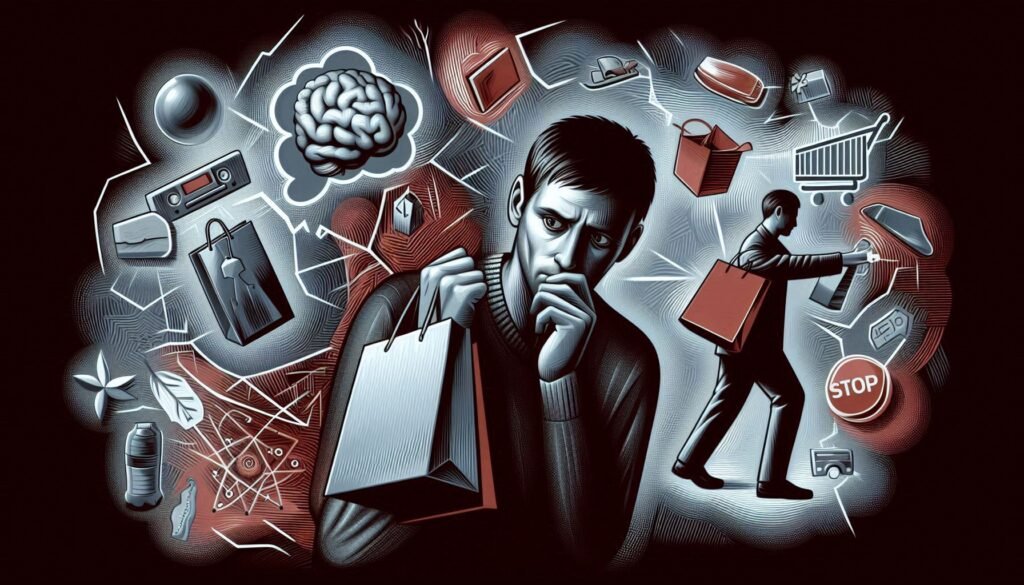Kleptomania is often misunderstood, frequently brushed off as mere theft or petty crime. Yet, it goes far deeper than that. For those who experience this compulsive urge to steal, the act isn’t about financial gain; it’s a complex interplay of emotions and psychological factors. One such factor is neuroticism—a personality trait characterized by anxiety, moodiness, and emotional instability.
Understanding the relationship between neuroticism and kleptomania can shed light on why some individuals struggle with these behaviors while others do not. This blog will explore the diagnostic criteria for kleptomania, how neurotic tendencies contribute to stealing behaviors, and the intricate dynamics of stress and emotional regulation involved in these episodes. Join us as we unravel this complicated link between mental health and impulsive actions—because understanding is key to compassion and effective treatment.

Kleptomania: Diagnostic Criteria and Differentiation from Ordinary Theft
Kleptomania is classified as an impulse control disorder, distinct from typical theft. The diagnostic criteria outlined in the DSM-5 require that individuals experience recurrent urges to steal items they don’t need and cannot afford. This behavior leads to significant distress or impairment.
Unlike ordinary theft, kleptomania involves a compulsive drive rather than a calculated decision for financial gain. Those with this condition often feel tension prior to stealing, followed by a sense of relief or gratification during the act. However, guilt and remorse typically set in afterward.
To differentiate it from regular larceny, kleptomaniacs do not plan their thefts beforehand; their actions are impulsive and often spontaneous. They may take items merely because they can—a stark contrast to someone who steals out of necessity or intention.
Understanding these differences is crucial for proper diagnosis and treatment. Recognizing kleptomania as a psychological disorder helps destigmatize those affected and guides them toward effective support options.
Neuroticism as a Risk Factor for Developing Kleptomanic Tendencies
Neuroticism is characterized by emotional instability, anxiety, and mood fluctuations. Individuals high in neuroticism often experience heightened sensitivity to stressors and negative emotions. This makes them more vulnerable to engaging in maladaptive coping strategies.
Research suggests a strong correlation between neuroticism and kleptomania. Those with elevated levels of neurotic traits may resort to stealing as an escape from overwhelming feelings or unresolved conflicts. The act of theft can temporarily alleviate their emotional distress, reinforcing the behavior.
Kleptomaniacs typically find it difficult to regulate emotions effectively. Their impulsive nature fuels compulsive behaviors like stealing, which they believe offers immediate relief from their internal turmoil. However, this cycle ultimately perpetuates their mental health struggles.
Understanding the link between neuroticism and kleptomanic tendencies sheds light on treatment approaches. Addressing underlying personality traits can be crucial for effective intervention and support for those afflicted by this complex condition.
The Role of Anxiety and Stress in Triggering Kleptomanic Episodes
Anxiety and stress are significant factors that can trigger kleptomanic episodes in individuals with neurotic tendencies. For those already predisposed to impulsive behaviors, these emotional states can escalate feelings of tension and restlessness. The urge to steal often emerges as a misguided coping mechanism.
When anxiety peaks, it creates a sense of urgency in the mind. Individuals may feel overwhelmed by their emotions and seek immediate relief from their distress. Stealing offers a fleeting escape from reality, providing temporary satisfaction despite its morally questionable nature.
Additionally, everyday stressors can amplify underlying vulnerabilities associated with neuroticism. Situations such as job pressures or personal conflicts may heighten the desire to engage in compulsive stealing as an act of rebellion against emotional pain.
Understanding this relationship between anxiety, stress, and kleptomania is crucial for effective treatment strategies. Addressing these triggers through therapeutic methods can help individuals develop healthier coping mechanisms while reducing the need for theft-driven relief.
Emotional Regulation: Why Neurotic Individuals Turn to Stealing for Relief
Neurotic individuals often face heightened emotional responses, leading to difficulties in managing feelings like anxiety and sadness. This struggle can result in impulsive behaviors as a means of coping with overwhelming emotions. For some, the act of stealing becomes a temporary escape from their emotional turmoil.
Compulsive stealing provides an immediate rush or thrill that offers momentary relief from distress. The anticipation and excitement associated with theft can create a distraction from negative feelings, offering a fleeting sense of control over their lives. Unfortunately, this relief is short-lived.
After the initial high fades, guilt and shame typically follow. These emotions can further entrench neurotic individuals in their cycle of stealing as they seek to alleviate these painful feelings through more impulsive actions. This vicious loop reinforces maladaptive coping mechanisms rather than fostering healthy emotional regulation strategies.
Understanding these dynamics is crucial for addressing kleptomania among those with neurotic tendencies. By recognizing the underlying emotional struggles driving compulsive behavior, effective interventions can be developed to promote healthier ways to cope.
Cognitive Distortions: How Neurotic Thinking Patterns Fuel Kleptomanic Urges
Cognitive distortions play a significant role in the behaviors of individuals grappling with neuroticism and kleptomania. These distorted thought patterns can fuel compulsive stealing, often leading to impulsive decisions that feel justified at the moment. Neurotic individuals may perceive situations through a lens of negativity or catastrophizing, making them more susceptible to irrational impulses.
For instance, they might convince themselves that taking an item is harmless because “everyone does it” or “it won’t matter.” This rationalization serves as a coping mechanism for deeper emotional distress. Such distorted thoughts can create a disconnect from reality, allowing for easy justification of kleptomaniac urges.
Moreover, these thinking patterns can perpetuate cycles of guilt and shame after the act has occurred. The internal dialogue shifts from justification to self-criticism almost immediately. This leads to heightened feelings of anxiety and further reinforces their need for relief through theft.
Understanding these cognitive distortions is crucial in addressing kleptomanic behavior within neurotic individuals. By challenging these erroneous beliefs, effective strategies can be developed for healthier emotional regulation.
Shame and Guilt: The Emotional Aftermath in Neurotic Kleptomaniacs
Shame and guilt often plague neurotic kleptomaniacs after a theft. These emotions can be overwhelming, leading to intense self-loathing. The act of stealing may initially provide a fleeting sense of relief or excitement. However, the aftermath is marked by deep remorse.
Neurotic individuals tend to be highly sensitive to criticism and judgment from others. This sensitivity amplifies feelings of shame, making it difficult for them to cope with their actions. They might ruminate on their behavior, further entrenching negative thought patterns that reinforce their emotional turmoil.
Guilt also plays a significant role in this cycle. Kleptomaniacs may feel they have betrayed not just societal norms but also themselves and their values. This internal conflict can lead to withdrawal from relationships as they fear exposure and rejection.
The emotional burden creates a vicious cycle where shame drives more impulsive actions in an attempt to escape these feelings temporarily. Understanding this dynamic is crucial for effective intervention strategies tailored towards neurotic kleptomaniacs.
Impact on Relationships: Social and Legal Consequences of Kleptomania
Kleptomania can severely affect personal relationships. Loved ones often struggle to understand the compulsive behavior, leading to feelings of betrayal and mistrust. This confusion frequently results in strained connections and emotional distance between partners, family members, and friends.
Socially, individuals with kleptomania may withdraw from social events due to fear of judgment or exposure. The stigma surrounding stealing can lead to isolation. Friends may choose to distance themselves from someone involved in theft-related activities.
The legal consequences are equally daunting. A kleptomaniac caught stealing faces criminal charges that could result in fines or imprisonment. Legal issues further complicate existing relationships as trust erodes and families grapple with shame.
These challenges create a cycle where neurotic tendencies worsen due to stressors related both socially and legally. The impact is profound, affecting not just the individual but also their network of support systems—making recovery even more complicated.
Treatment Modalities: Cognitive-Behavioral Approaches for Neurotic Kleptomania
Cognitive-behavioral therapy (CBT) has emerged as an effective treatment for individuals grappling with neuroticism and kleptomania. This approach focuses on identifying and altering negative thought patterns that contribute to compulsive stealing behaviors. By reframing these thoughts, patients can develop healthier coping mechanisms.
Through CBT, clients learn to recognize triggers that provoke their urges to steal. Understanding the link between emotions and actions is crucial in this process. Patients gain insights into how anxiety or stress might lead them toward impulsive decisions.
Behavioral techniques are also employed during sessions. These may include exposure exercises designed to confront situations where stealing typically occurs without acting on those impulses. Gradual desensitization helps reduce the frequency of kleptomaniac episodes over time.
Moreover, CBT emphasizes skill-building in emotional regulation and problem-solving. As patients enhance their ability to manage feelings associated with neuroticism, they often find themselves better equipped to resist urges related to kleptomania.
Pharmacological Interventions: Balancing Neuroticism and Impulse Control
Pharmacological interventions can play a significant role in managing neuroticism and kleptomania. Medications often target the underlying symptoms of anxiety and impulsivity that contribute to compulsive stealing behaviors. Selective serotonin reuptake inhibitors (SSRIs) are frequently prescribed for these conditions, as they help regulate mood and reduce anxiety.
Other medications, such as mood stabilizers or atypical antipsychotics, may also be considered. These options aim to enhance impulse control while alleviating emotional distress associated with neurotic traits. Each individual’s response to medication varies, making personalized treatment plans crucial.
Regular consultations with mental health professionals ensure ongoing support and adjustments when necessary. This collaborative approach helps monitor side effects and effectiveness over time.
While pharmacotherapy can significantly aid individuals struggling with kleptomania linked to neuroticism, it is essential to integrate these interventions into a broader treatment strategy that includes therapy and lifestyle modifications for optimal outcomes.
Support Groups and Therapy: Building Coping Skills for Neurotic Kleptomaniacs
Support groups and therapy play a crucial role in the journey toward managing neuroticism and kleptomania. They provide safe spaces where individuals can share their experiences without judgment. These environments foster understanding, which is essential for healing.
Therapeutic approaches often focus on building coping skills. Cognitive-behavioral therapy (CBT) helps patients identify triggers related to their stealing behaviors. By addressing these root causes, individuals learn healthier ways to cope with anxiety or stress.
Additionally, support groups offer social connections that are vital for emotional well-being. Sharing stories of struggle and success creates a sense of community among members who truly understand each other’s challenges.
Both group settings and individual therapy empower neurotic kleptomaniacs to take control of their impulses. Developing new strategies allows them to manage urges effectively while promoting positive change in their lives.
As they gain insight into the connection between neuroticism and kleptomania, participants can start rebuilding relationships strained by compulsive stealing behaviors. These support networks contribute significantly to long-term recovery and improved quality of life.


